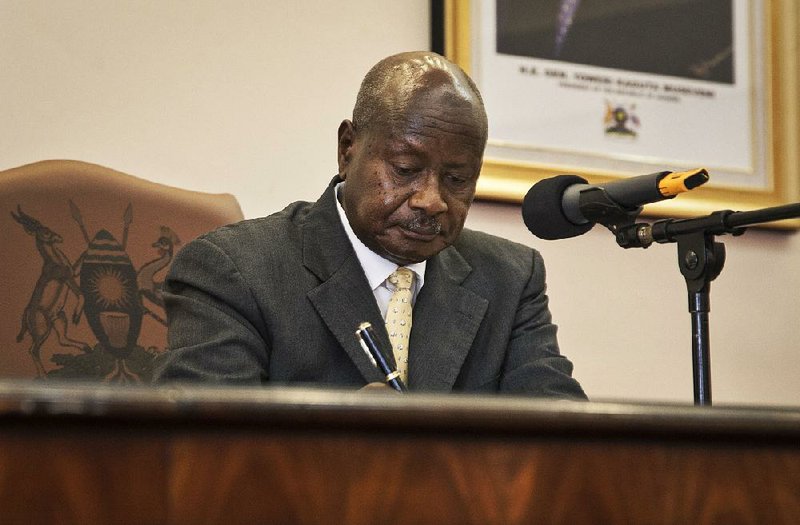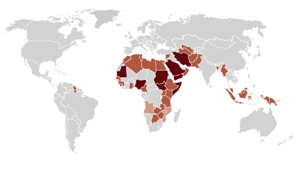LONDON - Brushing aside Western threats and anger, President Yoweri Museveni of Uganda significantly strengthened Africa’s anti-gay movement Monday, signing into law a bill imposing harsh sentences for homosexual acts, including life imprisonment in some cases, government officials said.
The move came weeks after Museveni’s Nigerian counterpart, Goodluck Jonathan, took similar steps in his own country, threatening offenders with 14-year prison terms. The Ugandan law seemed even tougher, threatening life terms on charges including “aggravated homosexuality,” meaning homosexual acts with a minor, a disabled person or someone infected with HIV.
“We Africans never seek to impose our view on others. If only they could let us alone,” Museveni said, according to The Associated Press, alluding to Western pressure to reject the bill.
He signed the legislation at his official residence at Entebbe, near the capital, Kampala, in front of government officials, journalists and a team of Ugandan scientists who had said they found no genetic basis for homosexuality - a conclusion that Museveni cited in support of the new law, the AP said.
While Western gay-rights campaigners have accused U.S. evangelical Christian groups of promoting anti-gay sentiment in Uganda, Museveni accused “arrogant and careless Western groups” of seeking to draw Ugandan children into homosexuality.
The Ugandan government spokesman, Ofwono Opondo, said Museveni wanted to sign the bill “with the full witness of the international media to demonstrate Uganda’s independence in the face of Western pressure and provocation.” Opondo announced on Twitter that Museveni had signed the bill, which drew condemnation from rights groups and Ugandan activists.
“It’s a gloomy day, not just for the gay community in Uganda but for all Ugandans who care about human rights, because this law will affect everybody,” Julian Peppe Onziema, an advocate for gay rights in Uganda, told Reuters.
The country’s Parliament approved the law in December, saying it was aimed “at strengthening the nation’s capacity to deal with emerging internal and external threats to the traditional heterosexual family.”
Later that month, Museveni wrote a letter to Parliament saying that lawmakers had made procedural errors in passing the bill and that an in-depth study was needed before it could be taken up again. Museveni said at the time that he would seek further expert opinions.
But this month, Museveni shifted position and said he would sign the bill, apparently bowing to strong conservative opinions among Ugandans. Gay-rights activists in Uganda have vowed to oppose the legislation, which could jeopardize hundreds of millions of dollars in crucial Western development aid.
According to Amnesty International, homosexuality is illegal in 38 of 54 African countries, but Western opposition to such measures is frequently interpreted as what Museveni on Monday called “an attempt at social imperialism, to impose social values.”
Last week, President Barack Obama called the legislation “a step backward for all Ugandans,” and administration officials were quoted as saying the law could result in a review of relations with the United States.
Washington is one of Uganda’s biggest aid donors. Additionally, Museveni is an important ally in the West’s efforts to curb Islamic militancy in Somalia, where Uganda has played a central role in an African Union peacekeeping force.
There were concerns about the likely effects of the law.
“Disapproval of homosexuality by some can never justify violating the fundamental human rights of others,” Navi Pillay, the top U.N. human rights official said in a statement in Geneva.
“This law will institutionalize discrimination and is likely to encourage harassment and violence against individuals on the basis of their sexual orientation. It is formulated so broadly that it may lead to abuse of power and accusations against anyone, not just LGBT people,” she said, using the initials for lesbian, gay, bisexual and transgender people.
In Nigeria, Jonathan’s approval of the similar legislation there inspired mob violence against gays in areas including the capital, Abuja.
The Ugandan law was first proposed in 2009, when an earlier provision, since dropped, proposed the death sentence for homosexual activity in some cases.
As the signing in Uganda approached Monday, retired Archbishop Desmond Tutu of South Africa, a strong voice in the struggle against apartheid, said in a statement: “We must be entirely clear about this: The history of people is littered with attempts to legislate against love or marriage across class, caste, and race. But there is no scientific basis or genetic rationale for love.”
Tutu, who said Museveni had assured him that the bill would not be signed, declared: “There is no scientific justification for prejudice and discrimination, ever. And nor is there any moral justification. Nazi Germany and apartheid South Africa, among others, attest to these facts.”
Front Section, Pages 6 on 02/25/2014

